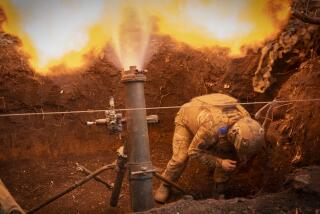A-Arms Have Role in Europe, NATO Says : Security: Despite a decision to reduce the weapons, officials say, they remain a vital deterrent.
- Share via
TAORMINA, Sicily — Officials of the North Atlantic Treaty Organization confirmed Friday that NATO would reduce nuclear weapons in Europe to a “minimum”--but also declared that atomic arms would still be kept on the Continent for the “foreseeable future.”
“We can’t dis-invent nuclear weapons,” NATO Secretary General Manfred Woerner said after a two-day meeting of defense ministers--acting as the nuclear planning group--at this Mediterranean resort. “We believe that nuclear weapons are an essential instrument to prevent any kind of war simply by keeping the risks high enough.
“I do not see a situation in which we would de-nuclearize Europe.”
Woerner said nuclear weapons are the “ultimate guarantee” of European security.
The NATO statement, after the meeting, came on the heels of a Thursday decision to slash nuclear weapons in Europe by 80%, leaving only about 700 air bombs in the atomic armory.
The drastic cutback of nuclear weapons, all battlefield artillery shells and missiles, brings the overall total of atomic arms to less than it was 10 years ago, officials said.
Further, NATO then had 11 types of nuclear weapons, while in the future, there will be only one: gravity bombs dropped from aircraft. The secretary general said none of the seven NATO nations where nuclear weapons are reportedly stored have asked to have them removed.
Woerner described the Taormina meeting as the most “far-reaching” defense ministers’ conference in NATO history, adding: “This is a very crucial moment both in the history of our alliance and in the history of Europe.” He further declared: “The alliance is undergoing a major political and military transformation.”
In addition to the decisions on nuclear weapons, the defense officials agreed Friday to a drastic scaling-back of NATO’s armed forces--the details of which will be presented to the heads of government at a NATO summit in Rome next month.
Woerner and U.S. Defense Secretary Dick Cheney on Friday downplayed the controversy that has arisen over French-German proposals to develop a military unit independent of NATO.
They said the details of the proposal had not been spelled out, but they thought that Europe could seek to develop its own security apparatus under the nine-member Western European Union.
Cheney, however, insisted: “We have a very strong feeling that whatever is done should not detract from or undermine or in any way erode the effectiveness of NATO.”
He restated the questions on the minds of Americans, Britons and other NATO officials who have been puzzled by the French-German proposal revealed earlier this week. Those are: What would be its role, where would it operate and what forces would comprise it?
Cheney said the United States would reserve judgment on the proposed force until its mission is clarified. The French, not being part of NATO’s unified military command, do not attend meetings of the defense ministers.
The defense officials of the 16-member alliance also discussed what the communique called the “crucial issue of the control of nuclear weapons in the Soviet Union.” NATO says the Soviets have strategic nuclear missiles in four republics and tactical atomic weapons in others.
More to Read
Sign up for Essential California
The most important California stories and recommendations in your inbox every morning.
You may occasionally receive promotional content from the Los Angeles Times.










